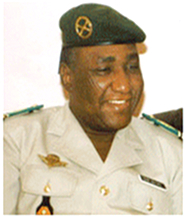Daouda Malam Wanké

Daouda Malam Wanké | |
|---|---|
 | |
| 6th President of Niger as President of the National Reconciliation Council of Niger | |
| In office April 11, 1999 – December 22, 1999 | |
| Prime Minister | Ibrahim Hassane Mayaki |
| Preceded by | Ibrahim Baré Maïnassara |
| Succeeded by | Mamadou Tandja |
| Personal details | |
| Born | May 6, 1946 near Niamey, Niger, French West Africa |
| Died | September 15, 2004 (aged 58) Niamey, Niger |
Daouda Malam Wanké (May 6, 1946 – September 15, 2004) was a military and political leader in Niger. He was a member of the Hausa ethnic group.
Wanké's year of birth is disputed. Many sources claim it is 1954[1] while others suggest 1946.[2]
Biography
[edit]He was born in Yellou, a town near Niger's capital, Niamey. He entered the Niger military, rising to the rank of Major. On April 9, 1999, Wanké led a military coup in which President Ibrahim Baré Maïnassara, who himself had come to power in a military coup, was assassinated.[3][4] For two days there was much political uncertainty in Niger, as the prime minister, Ibrahim Hassane Mayaki and several others also had claims on the presidency. On April 11, 1999, Wanké became president, heading a transitional government that promised to hold elections later that year.[5]
Wanké's government fulfilled its promise, and turned over power to the newly elected president, Mamadou Tandja, in December 1999. Wanké subsequently suffered from various health problems, including cardiovascular troubles and high blood pressure. During the last months of his life, he traveled to Libya, Morocco and Switzerland for medical treatment. He died in Niamey. He is survived by a wife and three children.
References
[edit]- ^ Niger.
- ^ "Wanké, Daouda Malam", Rulers.
- ^ Niger: The people of Niger have the right to truth and justice[permanent dead link], April 6, 2000
- ^ Amnesty International. President Mainassara: A profile, BBC, April 9, 1999.
- ^ Niger: A copybook coup d'etat, April 9, 1999, BBC. Military controls Niger, April 10, 1999, BBC.